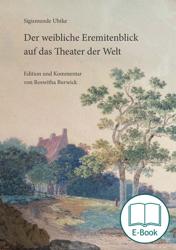Der weibliche Eremitenblick auf das Theater der Welt, edited for the first time, introduces the Silesian writer Sigismunde Uhtke who, at the threshold of modernity, sketches a progressive model of femininity, designed to shape decisively the transformation of self and society. Uhtke's text thus becomes a testimony to the time of change, when firmly established norms are questioned and feminine writing goes beyond a gender-specific ideology. With her appeal to piety, reason, and feeling, she advocates a catalog of virtues that is based on the ability to think independently and act ethically and morally, which includes the freedom to choose an albeit unconventional life that allows the development of female agency.
Current discourse in German Women’s Literature has concentrated on the writings of prominent authors such as Anna Louisa Karsch, Sophie von LaRoche, Henriette von Egloffstein, Sophie Mereau, Caroline Schlegel, Bettine von Arnim, Rachel Varnhagen, and Anna Amalia, the duchess of Weimar. In contrast to these women and their embrace of popular forms such as the novel, travel literature, poem or drama, the Silesian writer Sigismunde Uhtke (1752-1813) is inspired by the expressive language of Baroque literature and the moods evoked by its anachronistic style. A cursory reading of her short moral and pedagogical narratives seems to suggest a female ideal that conforms to the stereotype propagated in 18th century Tugendschriften. Yet a closer reading reveals that the first-person narrator not only critiques but also subverts the image of the docile wife and mother who takes care of her family, raises her children with exemplary pedagogical methods and increases the family finances with her frugality and managerial talents. Rewriting the discourse of female normative behavior, Uhtke creates a resourceful character in the persona of the recluse who has shed the role of the traditional 18th century female to claim an independent consciously autonomous selfhood. In creating a new genre, Der weibliche Eremitenblick auf das Theater der Welt (The Female Gaze on the Theater of the World) refashions the medieval Vita of the Saints into the narrative of a woman who has found her voice. Whereas the medieval recluse lives her life in pursuit of perfectio, i.e. in unconditional service to Christ, Uhtke’s recluse defines her hut as a space of vision of an enlightened human condition. Both actor and spectator, she not only views the spectacle, but comments it, interferes with it, subverts it, and determines its direction. The contemplative pious existence is replaced by an outward looking view that aims at improving the lives of others because her own sorrowful life experiences had provided her with a profound insight into the human psyche. Intertwining personal Christian faith with the rationality of the enlightenment and the emotions of the age of sensibility, Uhtke fashions a space of action that shapes interhuman relationships through the lens of progressive female agency.
Roswitha Burwick is professor emerita of Scripps College where she held the Distinguished Chair of Modern Foreign Languages. Her areas of research are German romanticism, especially Achim von Arnim, whose writings in natural science and collected essays she edited in the Weimarer Arnim-Edition (WAA II and III). Her publications include essays on Achim von Arnim, Bettina von Arnim, Günderrode and fairy tales. She is the Vice President of the Internationale Arnim-Gesellschaft and editor of the Neue Zeitung für Einsiedler.


 Sample
Sample